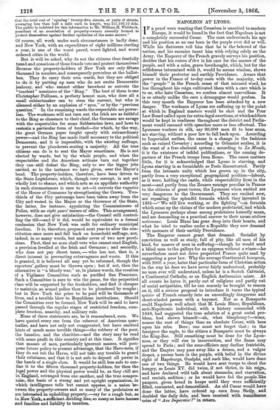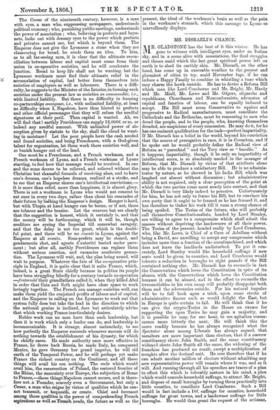NAPOLEON AT LYONS.
: Va proof were wanting that Cresarism is unsuited to modern Europe, it would be found in the fact that Napoleon is not a completely successful Ca3sar. The man understands his age and his position as no one born in the purple ever did or will..
While his flatterers tell him that he is the beloved of the nation, and his enemies taunt him with relying solely on the Army, the Emperor of the French gravely surveys his position, decides that his raison d'dtre is his care for the masses of the people, and with a calm, grave forethought, which, but for the- selfishness intermixed with it, would be serene wisdom, shows- himself their protector and earthly "Providence. Aware that power in the France of to,day rests with the majority, with the "people" in the French -sense of that misused word, he has throughout his reign cultivated them with a care which is to us, who hate Cwaarism, we confess almost marvellous. It is so utterly unlike the rare a demagogue would profess. In this very month the Emperor has been attacked by a new danger. The workmen of Lyons are suffering up to the point- at which in England masters would be shot and the Poor Law Board called upon for extra-legal exertions, at which soldiers would be kept in readiness throughout the district and Parlia- ment would resound with speeches more or less effectual. The Lyonnese workers in silk, say 90,000 men fit to bear arms, are starving, without a poor law to fall back upon. According to Imperialist scribes, the cause is a change in the fashions- such as ruined Coventry ; according to Orleanist scribes, it is the want of a free electoral system ; according to Le Monde, it is the existence of infidel publications, or the coming de- parture of the French troops from Rome. The cause matters little, for it is acknowledged that Lyons is starving, and Lyons starving is as formidable as Paris discontented. 'Partly from the intimate unity which has grown up in the city, partly from a very exceptional .geographical position--labour, as it were, holding the castle, while respectability lives in the moat—and partly from the Zouave courage peculiar in France to the citizens of great towns, the Lyonnese when excited are very dangerous to the Government. They are excited now, are repeating the splendid formula which they invented in 1831—"We will live working, or die 'fighting "—a formula, which sums up the claims of the modern proletariat, and which_ the Lyonnese perhaps alone among proletaires honestly mean, and. are demanding as a practical answer to their moan ateliers- nationaux. Louis Blanc has gone deep into their hearts, and what he tried to realize under a Republic they now demand with menaces of their earthly -Providence.
The Emperor cannot grant that demand. Socialist by
conviction as well as study, full of pity, like all men of his kind, for masses of men in suffering—though he would send a blind man to the galleys for an epigram without a wince—he- nevertheless must not drive propertied France quite mad by suggesting a poor law. Why the average Continental bourgeois, with 2001. a year, hates that particular form of Christian action. in the way he does we have never fairly understood, probably no man ever will understand, unless he is a Scotch Calvinist, a Continental Catholic, or an English Antinomian miser. At- all events he hates it, partly out of religious and partly mit, of social antipathies, till he can scarcely be brought to reason on it, till a serious proposal to introduce it turns the typical. spicierof French comedy into an exceedingly' dangerous and short-winded person with a bayonet. Nor as a Bonaparte- could Napoleon well admit that M. Louis Blanc, Republican, anti-Napoleonic individual, with a history connected with 1848, had suggested the true solution of a great social pro- blem, had shown himself-9,h, what blasphemyl—wiser, nearer the root of things than an absolute Cwsar, with bees. upon his robe. Bees ; one must not forget that ; to the foreigner the eagle, to the citizen a Bonaparte must be always. the King-Bee. Still something must be done for the Lyon- nese, or they will rise in insurrection, and the flame may
to Paris ; and the sous-officiers may decline fratricide,
and the Empire may pass away like a dream, and a vulgar despot, a person born in the purple, with belief in the divine right of Hapsburgs, Guelphs, and such like, would have done one of two things. He would have sent troops to shoot the hungry, as Louis XV. did twice, if not thrice, in his reign, and have declared Wild talk about stomachs, and starvation, and rentals, sedition ; or he would have fed the people like, paupers, given bread in heaps until they were sufficiently filled, contented, and demoralized. An old Ca3sar would have done the latter, have ordered up corn from Sicily, and doubled the daily dole, and been received with turonitnous cries of "Ave Imperator I" in return.
The Cmsar of the nineteenth century, however, is a man With eyes, a man who, suppressing newspapers, understands political economy; who, punishing public meetings, understands the power of association ; who, believing in prefects and bayo- nets, looks out with dreamy eyes to the power which prefects and privates cannot see, but which is beyond them. The Emperor does not give the Lyonnese a stone when they are clamouring for bread, he sends them an idea. To him, as to all far-seeing men, it is clear that the ultimate recon-
ciliation between labour and capital must come from their union in co-operative societies, and he will accelerate the junction. -Bread to keep life shall not be wanting, but the
Lyonnese workmen must find their ultimate relief in the accumulation of capital, had better form themselves into societies of employers as well as labourers. There is a diffi-
culty, he suggests to the Minister of the Interior, in forming such societies under the present law as societies en commanclite, i.e.,
with limited liability. But there is no difficulty in forming
co-partnerships anonyms, i.e., with unlimited liability, at least no difficulty when I, Napoleon, have thus hinted to prefects
and other official personages that they will .refuse the needful signatures at their peril. Then capital is wanted. Ah, we will find that I earthly Providence can supply 12,000/. or so, or indeed any needful amount. With unlimited power of ab-
sorption given by-statute to the sky, shall the cloud be want- ing in moisture? Let the poor people have the cash needed and found societies, and being Frenchmen, with a God-given talent for organization, let them work those societies well, and so banish hunger out of the land.
One must be a Frenchman, and a French workman, and a French workman of Lyons, and a French workman of Lyons starving, to feel how that message would be received. In one
and the same decree to be relieved, and relieved without the Christian but shameful formula of receiving alms, and to have
one's dreams, one's hopeless dreams, realized at a stroke, and to see that an Emperor shares one's intellectual convictions,— it is more than relief, more than happiness, it is almost glory.
There is not a workman in Lyons who would not consent to eat once in every two days, rather than cheat his comrades of their future by balking the Emperor's design. Hunger is hard, but with Utopia at band hunger can be borne, or if not, there are tobacco and the brazier. Let the weavers but see clearly that the suggestion is honest, which it certainly is, and that the money will be forthcoming, which it will be, though creditors are eyeing the Imperial till somewhat savagely, and that the delay is not too great, which is the doubt-
ful point, and there will be no e'nieute in Lyons, against the
Emperor at all events. Sous-prefets may be stoned, and gendarmerie shot, and agents d'autorite buried under pave- ment; but after all, earthly Providences can replace them without serious exertion, and vacancies accelerate promo- tion. The Lyonnese will wait, and, the plan being sound, will wait to purpose. Whatever the fate of the co-operative prin- ciple in England, it is quite clear that it suits France, which, indeed, is a great State chiefly because in politics its people have been struggling blindly for a century towards co-operation
—fraterniti their grandfathers called it, when they killed Abel in order that Cain and Seth might have clear space to work
lovingly together. The French can manage societies well, can make themyield the conjoined profits of labour and of capital, and the 'Emperorin calling on the Lyonnese to work out that system fully does but take the lead in the direction to which the national genius is inclined, does but articulately advise that which working France inarticulately desires.
Nobler work can no man have than such leadership, but then it is work which only a leader can do, and leadership is incommunicable. It is strange, almost melancholy, to see how perfectly the Emperor succeeds whenever success will do nothing towards the establishment of his dynasty, for which he chiefly cares. He made authority once more effective in France, lie drove back Russia, he made Italy, he. conquered Mexico, he gave Germany her grand impetus, he will rid earth of the Temporal Power, and he will perhaps yet make France the richest country on the Continent, and all these things Will avail his son nothing. The ends which would avail him, the resurrection or Poland, the restored frontier of the Rhine, the suzerainty over Europe, the subjection of Rome to France,--these things Napoleon cannot secure, and is there- fore not .a Founder, scarcely even a Government, but only a
Csesar, a man who reigns by virtue of qualities which he can- not transmit, or bequeath, or create. Chief and foremost among those qualities is the power of comprehending French wopirations as well as French needs, the future as well as the
present, the ideal of the workman's brain as well as the pain in the workman's stomach, which this message to Lyons so marvellously displays.































 Previous page
Previous page